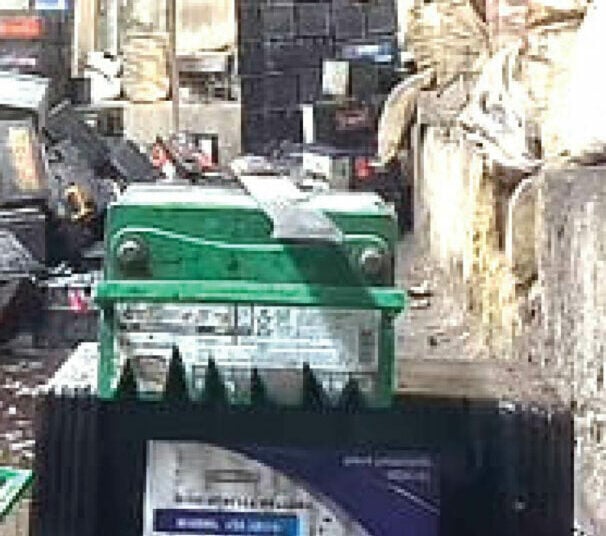In the bustling markets of Aba, Abia State, amidst the cacophony of traders and the vibrant tapestry of daily commerce, a battery vendor simply named Chinedu Nwafor found his livelihood. Each day, he sells an array of batteries — from small AA cells to larger lead-acid types used in vehicles and generators.
As his business thrives, so does the accumulation of used and defective batteries. Lacking proper disposal knowledge, Nwafor often discards the batteries into nearby municipal dumpsites, considering it a routine aspect of business operations where some scavengers pick them to resell and eke out a living on daily basis.
Months passed, and the rainy season arrived. Torrential downpours washed over the city, seeping through the discarded batteries, leaching toxic metals like lead and mercury into the soil and groundwater through floods that crisscross the South East belt, wrecking invisible havocs. Unknown to the residents, their primary water sources became tainted with the hazardous substances.
Checks by this newspaper show that some of the residents – across the country – have suffered inexplicable health issues. Children exhibited developmental problems, adults experienced kidney ailments, and mysterious illnesses became commonplace. The local clinics, mostly ill-equipped and overwhelmed, struggled to find the root cause, treating symptoms without understanding the underlying poison infiltrating their lives.
As it is in Aba, so it is across Nigeria where it’s common to find people transact in condemned or dead batteries for profit. The unseen consequences to those folks and the society are many. Nigeria, after South Africa, is the second highest producer of electronic waste in Africa.
According to environmental health experts, improperly disposed batteries can lead to various health problems due to the toxic chemicals they contain, including heavy metals like lead, mercury, and cadmium, as well as corrosive substances. These can contaminate soil and water, eventually entering the food chain and potentially causing neurological damage, kidney problems, developmental issues, and even cancer. Additionally, lithium-ion batteries commonly used in electronics, pose fire and explosion risks if damaged or improperly handled.
An environmental health specialist, Yunusa Nazif said that exposure to lead and mercury, often found in batteries, can cause neurological problems, especially in children. Neurological disorders are a significant public health concern in Nigeria, with stroke, epilepsy, and spinal cord compression being among the most prevalent.
Apart from that, the environmentalist also linked Cadmium exposure to kidney damage. An estimated 36 million people are said to be living with Chronic Kidney Disease (CKD) in Nigeria, according to a study published in the National Institutes of Health (NIH) I (.gov). Also, a 2022 World Kidney Day National Screening Programme found pooled kidney disease prevalence at 13.7% in adult Nigerians.
What this implies is that approximately one in seven Nigerians may be affected by some stage of kidney disease that could have been caused by exposure to battery substances.
Findings by this newspaper showed that lead and mercury (battery properties) exposure can lead to developmental problems, particularly in children. Beyond that are the major factors of Nickel and lithium which medicals say can cause respiratory issues, and battery fires can lead to smoke inhalation injuries.
Some battery components, like cadmium, are known carcinogens; cause brain damage, impair hearing, and induce behavioural problems in children and even cause memory loss in adults. Apart from soil pollution, “Battery fires can release harmful fumes into the air, contributing to air pollution,” Zambian-based environmental pollution control specialists, Villen Tony said.
Director-general of National Environmental Standards and Regulations Enforcement Agency (NESREA), Innocent Bariko told a stakeholders’ meeting that “the improper handling of these batteries pose severe environmental and health challenges to the populace,” adding that “The informal sector especially, which often handles waste batteries without proper formal regulation by way of governance, significantly contributes to environmental pollution, on the soil, air and water.”
It’s difficult to fault him on that. Nigeria has many ungoverned places where anything and everything goes. A visit to most of the abattoirs across the country where the slaughter and processing of livestock for human consumption are done easily reveals pictures of dirt, stench and incubators of all kinds of life threatening diseases, including Anthrax disease. For instance, infections that are potentially zoonotic in nature are easily transmitted from animals to humans. According to a Gavi hosted digital news platform, VaccinesWork, Anthrax spores can survive in the soil for decades and new outbreaks are usually sparked by soil disturbances, like floods as it is being experienced across Nigeria today.
From the ever busy Dei Dei Abattoir in the Federal Capital Territory to New Kwata Abattoir in the Suleja area of Niger State, the billowing thick smokes of flames from burning tyres used to roast tens of livestock daily is evident enough to show a nation without proper environmental regulation. That’s even besides the ubiquitous smelling gutters and canals in the country.
Arriving from a nationwide awareness campaign earlier in the year, executive secretary of Alliance for Responsible Battery Recycling (ARBR), Mrs. Miranda Amachree, said “We discovered a lot of improper handling with unsustainable and crude practices which prompted us to extend our services to the informal collectors. We have offered a free registration for one year, blood lead test and provision of minimal PPE to build trust and bring them into the loop to protect the environment and health.”
The federal government launched National Environmental (Battery Control) Regulations, 2024 as an apparatus for environmental compliance monitoring and enforcement in the Battery Sector of the Nigeria economy.
Under the federal government-initiated Extended Producer Responsibility (EPR) programme, producers/importers of batteries are required to take responsibility for the take-back of their waste as contained in the National Environmental (Battery Control) Regulations and the National Policy on Waste Battery Management.
The regulations require every battery manufacturer, importer, distributor, retailer, including waste battery generators, collectors and recyclers to share in the cost and responsibility of managing waste batteries in Nigeria.
However, despite the launch of the battery control regulations, the abuse, uncontrolled circulation and indiscriminate disposal of batteries remains rife in Nigeria.
According to reports, improper disposal of batteries contributes to over 40% of hazardous chemicals in landfills, posing significant risks of groundwater contamination. Toxic metals from batteries can seep into soil and water sources, leading to serious health risks for communities, including neurological and kidney damage.
A British investor and the chief executive officer of Hinckley E-Waste Recycling Ltd with interest in battery recycling in Nigeria, Adrian Clews, said Nigeria is responsible for churning out 200,000 metric tonnes of electronic waste which is one of the most toxic wastes around the world. His firm, Hinckley Recycling is establishing the first lithium-ion and lead-acid battery recycling facility in Nigeria, which is expected to create a new high-value export industry in Ogun State.
Alliance for Rural Electrification (ARE) wrote in one of its articles on 19 August, 2024 that alluded that the rise of Decentralised Renewable Energy (DRE) systems in Africa has brought about an increased deployment of batteries, particularly lead-acid batteries, which are the most used battery-type on the continent.
As production volumes soar, the issue of sustainable battery recycling has come to the forefront. Today, project developers face a significant dilemma: where to send used batteries to ensure environmentally sound recycling. Unfortunately, most recycling plants fail to meet environmentally sound recycling standards, leading to severe lead exposure. Globally, one in three children has elevated blood lead levels, resulting in lifelong health consequences.
According to Alliance for Rural Electrification, the economic impact of lead exposure in Nigeria is staggering, costing up to $16.2 billion annually, or 3.94% of the GDP. “The root cause of pollution in lead-acid battery recycling lies in unregulated markets where low-standard industrial smelting emerges as a highly profitable business since environmental costs is ignored. These operations, characterised by low investment and operational costs, recover only 50-60% of lead and are highly polluting,” it stated.
Industry experts, including Oeko-Institute, ARE, SRADev Nigeria, and Platform Blei are firm on the conviction that transforming the battery recycling sector in Nigeria requires a multifaceted approach. Not a few people agree that the launch of such partnerships as the Partnership for Responsible Battery and Metal Recycling (ProBaMet), will help to support local regulators and stakeholders to address the issue in Nigeria.
Nigeria’s Minister of Environment Balarabe Abbas Lawal said “the Federal Government of Nigeria fully recognizes the dangers of improper management of used lead-acid batteries.” He told an international conference on Upgrading the Lead-Acid Battery Recycling Sector in the African Region on April 18 that proactive steps have been adopted to regulate and modernize the lead-acid battery recycling sector in Nigeria.
NESREA has been handed the mandate to ensure compliance and punish any violation of the rules. But as things stand, the will to enforce that authority is yet to be seen in action and as the situation gets worse by the day.
Amachree said regulation alone is not enough, stating that effective compliance with the regulations and monitoring depends on the active participation and cooperation of all stakeholders’ industry leaders, civil society organizations, government agencies, and the public. For her, Nigeria still needs to “create the necessary networks, partnerships, and collaborations to sensitize stakeholders to promote compliance with the provisions of the regulations”.
Environmental experts and stakeholders have expressed concerns over the improper disposal of batteries and electronic waste in Nigeria:
Dr. Okunola Alabi, a researcher in environmental contamination, highlights that the lack of official recycling activities and effective management policies leads to the informal disposal and crude recycling methods prevalent in Nigeria. This situation poses serious public health risks, particularly to women and children living near electronic markets and informal dumpsites.
Anambra State Commissioner for Environment, Mr. Felix Odimegwu, emphasizes that establishing industry standards for safe battery and metal recycling is a crucial step toward reducing environmental and health risks associated with these materials while promoting a circular economy.
This scenario is not isolated to Nigeria; the dangers of improper battery disposal are a global concern, manifesting in various tragic incidents.
Reports say in Australia, firefighters have faced a surge in fires linked to lithium-ion batteries found in everyday devices like e-scooters and vapes. These batteries, when improperly discarded or damaged, have caused explosions and fires, leading to severe injuries and property damage. Firefighters have responded to multiple incidents daily, highlighting the urgency of addressing this growing problem.
London’s Exploding Refuse Trucks: In North London, refuse workers narrowly escaped injury when a refuse truck exploded after combustible items, including batteries, were mistakenly placed into residential bins. The crushing mechanism of the truck triggered the explosion, projecting debris onto the street and underscoring the dangers of improper battery disposal.
Batteries contain both valuable and hazardous materials, while harnessing the value, hazardous waste is discharged to pollute the environment and the health of workers if not properly managed.
Way Forward
Industry experts agreed on the fact that the narrative of Nwafor and the global incidents serve as poignant ‘reminders of the hazards lurking in our hands’. To mitigate these dangers, the experts say Nigeria needs comprehensive strategies must be implemented. “We need public awareness campaigns, accessible recycling programmes, strict regulatory frameworks and investing in the development of safer, more sustainable battery technologies can reduce the inherent risks associated with current chemical compositions,” Alabi stated.
As Nigeria experiences rapid economic growth and increasing demand for energy storage solutions, the improper disposal and unsafe recycling of used lead-acid batteries (ULABs) across the country pose significant risks to human health and the environment.





